Welcome to Part III of Writing Wisdom: The Art of Research. Last week we covered World Creation concepts. This week we will investigate Cultural and Historical concepts. Additionally today we will dive into some scholarly thoughts on the purpose of research and its applications to the text. I assure you I think of these things while reading a book!
You will notice I have not yet addressed how to find, cite, or utilize research resources. This is not an oversight. I can tell you the number one reason for sloppy or no research lays in failure to grasp what is important and why. If you do not know what questions you are trying to answer before you crack open a book (or a webpage), then you may as well not even waste your time. I think many authors realize this and write it anyway, as I find myself constantly yelling at a book that's well written but draws me out of the world due to poor fact checking jarring reality.
In The Craft of Research by Booth, Colomb, and Williams (3rd Edition), we read on pages 5-6 (emphasis added):
You will struggle with your project if you don't know what readers look for... Experiences researchers know that they most often produce a sound [work] when they have a plan, no matter how rough, even if only in their heads. In fact, they create two kinds of plans: One helps them prepare and conduct their research; the second helps them draft their [story] with it.Now, the authors of this fabulous book (which really should be on every author's shelf... here's a link!: The Craft of Research, 3rd Edition) are generally talking about research for academia and journalism to some degree, but it applies equally well to us as authors. Notice that they say the plan can be in your head. It's okay if you aren't into outlining on paper as an author, but if you want a solid (ie, sound) work of literature, then you best start with a plan.
They usually begin with a question and a plan to guide their search for an answer. They may not know exactly what they'll find, but they generally know what it will look like, even if it surprises them. They also know that once they have an answer, they don't just start writing, any more than an experienced carpenter just starts sawing. They draw up a second plan, a rough blueprint for a first draft - maybe no more than a sketch of an outline. Shrewd researchers, though, don't let that plan box them in: they change it if they run into a problem or discover something that leads them in a new direction. But before they start a first draft, they begin with some plan, even when they know they'll almost certainly change it.
I will be referring to their book frequently over what I am beginning to expect will turn into a series that could last many months or even half a year. I have that much information to convey and relate, and I really don't see much on this for writers so I believe I'll be filling an important need. Maybe I'll lecture on it someday for a seminar.
I will also be referring to other books, but the most important one will be Old Testament Exegesis: A Handbook for Students and Pastors, by Douglas Stuart. Don't be fooled by the Old Testament aspect. This book is a goldmine of questions you should ask yourself and approaches to use when creating your masterpiece, most especially in the editing process to ensure you indeed have a brilliant story. For those curious, exegesis is the "critical explanation or interpretation of a text or portion of a text" (dictionary.com). It looks at what the text is really saying, not what you want it to say or how you feel it applies to you (which would be more eisegesis). Don't worry, I won't muddle you down in too many technical terms.
On that note, lets take a quick paragraph and consider some basic question you should ask about the culture and historical background of your novel.
Cultural and Historical concepts:
You want to start this by understanding the very beginning of the human (or alien or whatever the applicable races are) species. Will they have evolved or were they created or was there intelligent design? Was it 7,000 years ago, a hundred thousand, or just this morning? Did they evolve/arrive/come into existence in multiple areas or just one? When or did they find religion? Do different groups follow the same religious philosophy or not? Have there been wars, are there races in the species and does anyone care? Is there music and does it play a role in politics, religion, and social life? What are women's rights at this time? What have they been? Are your characters acting appropriately (I cannot tell you how frustrated I become reading a historical novel where the heroine seems to have all of the same freedoms, educations, and opportunities as a woman today... same goes for children, serfs and vassals, etc...). What are the hygiene habits? Do they have indoor plumbing? Do they hold festivals? The list can go on and on, but I hope these help lay the foundation for you to ponder what questions you should be asking yourself and your novel.
Next week: Researching Your Audience













0 comments:
Post a Comment